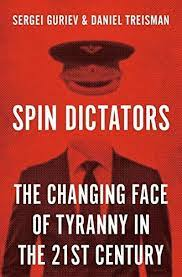Book Review: Spin Dictators: The Changing Face of Tyranny in the 21st Century
- The International Spectator

- Apr 17, 2023
- 4 min read
Updated: May 27, 2025
- by Olena Pokotilo
Despite the rather high demand for democratic tendencies in society, the relatively young twenty-first century cannot be named as fully democratized. Authoritarian regimes have found ways to mimic and adopt some features of democracies, become semi-democratic, take part in the international stage as full participants; however, their methods of government have remained the same: coercion, intimidation, subjugation and comprehensive surveillance. Over time, having adopted many positive aspects of the concept of Internet accessibility and its introduction it into areas of everyday life, such long-lived regimes began to integrate modern technologies into public life. Their only aim was to gain unlimited control over the current “god of the digital world” – the Information. It’s no secret that by controlling information and distorting it, anyone can achieve any goal. In the case of dictatorial/authoritarian regimes, their goal is to prolong their own power, retain it and abuse it. The authors of this book, Guriev and Treisman, conducted an in-dept analysis of the methods used by authoritarian (or hybrid) regimes to work with media outlets or social networks in order to form a public political opinion on a particular political directive, leader, reform or program. In this way, the regimes get the levers of unlimited power with the assistance of which they are able to control climate of opinion or shape it to their advantage.
As for the authors, Sergey Guriyev is a well-known Russian economist, professor at the Science Po in Paris and former chief at the European Bank for Reconstruction and Development. He also was an adviser to the former Russian President Dmitry Medvedev until he resigned and left Russia because of his criticism to the state policy. Daniel Treisman, in his turn, is a professor of political science at the University of California and is researcher of the National Bureau of Economic Research. Also, one of his books has been nominated for the Pulitzer Prize. Both authors are widely known for their studies of contemporary political and economic realities in Russia, its historical past and tendencies towards authoritarianism.
Throughout that book, the authors delve into the studies of the harm of information technology in the wrong hands, allowing dictators to concentrate power around themselves and monopolize the right to information. Moreover, such dictatorships adapt to the conditions of the surrounding open world and pose a threat to real democracies, as they present themselves as an alternative to the existing system and try to construct a positive image (the same in the case of President Putin, whom people and politicians may perceive as a strong leader). The authors also discuss the international aspects of the emergence problem, including the attempt of those regimes to intervene in other states’ affairs or inside International Organizations. Considering specific examples (Russia, Kazakhstan, Hungary, China) the authors paint quite convincing portraits of modern masked dictators (who are trying to hide their true anti-democratic nature under a fake pro-democratism facade) and explain how they achieve power and become so popular within the country and beyond its borders.
Each chapter provides a profoundly comprehensive analysis of contemporary authoritarian regimes with their historical superstructures or previous fundamental changes. The introduction suggests a brief presentation of classical dictator figures of the past and the strategies they used to directly eliminate millions of objectionable functioning units of society and potential political opponents. As time passes, as the authors report, the methods have changed somewhat under the pressure from the international community, whose opinion plays a significant role for dictators due to close economic ties and fear of sanctions (e.g., the case of China). Dictators began to use relatively “soft methods” with the assistance of rapidly spreading technologies: they just needed to vilify their opponents in the media to obtain support from the electorate and win the next election: the stake was not placed on physical destruction, but rather on the information one. Guriyev and Treisman call it “postmodern propaganda” or “a modernization cocktail” because it mixes various forms and methods of rulership. In the final chapter, they warn against a growing threat from those regimes that use manipulative media to create an attractive self-image and seek for international support and justification.
Such a complex multilevel study cannot fail to have certain disadvantages. For instance, the analysis is overly focused on the propaganda and the manipulativeness of pro-government media as the main source of regime “viability”, while economic and social factors are not mentioned (such as Russian funding of many International Organizations to create a positive perception for their members ). Moreover, the authors mostly use a statistical approach, which may miss the conceptual context of some countries. Furthermore, the research does not offer a solution to the current crisis but only warns about the threats of its aggravation. Nevertheless, the book is extremely timely and relevant - for the current Russo-Ukrainian war as well - since it draws attention to modern dictatorships and their use of propaganda advertising campaigns to strengthen their positions on the international stage. Furthermore, the distinctive approach of this research may attract readers who wish to study authoritarianism through the prism of marketing and advertising. Along with the clear and concise examples of usage of propaganda by different dictators, the whole analysis assists to a deeper understanding of the nature of modern authoritarianism. In conclusion, it could be said that, in the future, knowing the methods of a potential adversary may help neutralizing it, or at least it can be useful to protect citizens from external dangerous non-democratic influences. “The New Dictators” is an important contribution to the literature aimed at raising awareness on the impact of contemporary regimes on global politics and human rights.
Olena Pokotilo is Researcher for IAI- Istituto Affari Internazionali

.png)





Comments